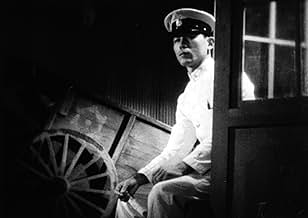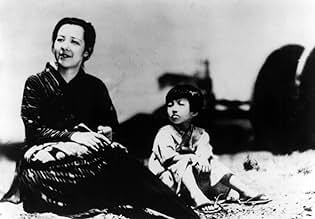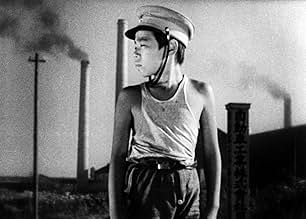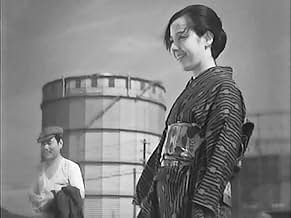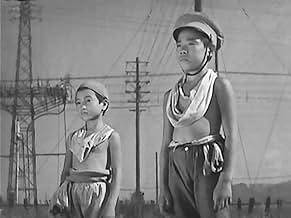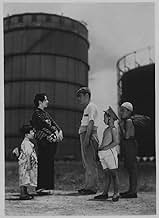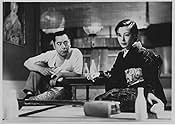IMDb RATING
7.4/10
1.8K
YOUR RATING
Unemployed Kihachi and his two sons struggle to make ends meet. But that doesn't keep Kihachi from wooing single mother Otaka.Unemployed Kihachi and his two sons struggle to make ends meet. But that doesn't keep Kihachi from wooing single mother Otaka.Unemployed Kihachi and his two sons struggle to make ends meet. But that doesn't keep Kihachi from wooing single mother Otaka.
- Director
- Writers
- Stars
- Director
- Writers
- All cast & crew
- Production, box office & more at IMDbPro
Featured reviews
10mgmax
The richly moving story of a hard-luck father and his two children, this masterpiece of unadorned realism may remind you more of Italian films like Shoeshine than Ozu's more staid work of the 50s. (The inspiration was probably Vidor's The Crowd, and a comparison with that masterpiece is by no means out of order.)
*** I SUMMERIZE THE GENERAL PLOT OF THE FILM AT LENGTH. NARRATIVE SPOILERS AHEAD ***
A man and two boys are seen walking along one of the many lonesome, dusty roads that exist inside the world of Ozu. They are shot from a low angle and against the monumental sky. They are like lone sailors lost at sea.
There is no work for the father (Kihachi), despite the numerous, booming factories, and so there is no food for the young, scrawny boys (Zenko and Masako). They are doomed from the start; trapped in a gray malaise and where luxury exists just out of reach.
Beautiful things happen in the in-between moments of Ozu's films. In his silent films, they usually happen in a field. There is an early scene in this film, where the boys and their father pantomime a rich feast full of fluffy, white rice and endless sake. This short reprieve from hopelessness is heaven for them, and we see them smile for the first time in the film's opening twenty minutes.
But the scene is much more beautiful still, because of the sorrowful, scoring of strings that accompany the images. Ozu may let his characters forget, for a while, their troubles, but he certainly doesn't intend for us to. This dichotomy between what we feel and what the characters feel creates an arresting sense of poignancy. Their temporary enjoyment is not meant for us.
The trio eventually catches a break, one presented to them by an old friend of Kihachi. She is a woman named Otsune with whom he used to kick up trouble. She is now reformed. She is running a restaurant and is able to dig up some work for Kihachi. The next ten days, he says, are the happiest of his life.
Things are complicated by Otaka, an impoverished single mother whose child has grown ill with dysentery. The two, fragmented families have met along their shared but separate paths of economic struggle. Kihachi has grown fond of the mother and the boys enjoy the company of her cherubic daughter. In an effort to repair his broken family, and because he has fallen in love, Kihuchi steals a large sum of money from a local officer to pay for the child's treatment, before turning himself in.
An Inn in Tokyo plays as a series of isolated moments in a bitter life full of cruel ironies. Even so, Ozu imbues a strong poetic beauty (in terms of how he frames this misery) within his social realism that allows the film to effectively absorb the viewer. The film succeeds in not simply drowning in its sea of anguish, but instead by providing a lens through which to see the unexpected moments of joy that go along with it.
A man and two boys are seen walking along one of the many lonesome, dusty roads that exist inside the world of Ozu. They are shot from a low angle and against the monumental sky. They are like lone sailors lost at sea.
There is no work for the father (Kihachi), despite the numerous, booming factories, and so there is no food for the young, scrawny boys (Zenko and Masako). They are doomed from the start; trapped in a gray malaise and where luxury exists just out of reach.
Beautiful things happen in the in-between moments of Ozu's films. In his silent films, they usually happen in a field. There is an early scene in this film, where the boys and their father pantomime a rich feast full of fluffy, white rice and endless sake. This short reprieve from hopelessness is heaven for them, and we see them smile for the first time in the film's opening twenty minutes.
But the scene is much more beautiful still, because of the sorrowful, scoring of strings that accompany the images. Ozu may let his characters forget, for a while, their troubles, but he certainly doesn't intend for us to. This dichotomy between what we feel and what the characters feel creates an arresting sense of poignancy. Their temporary enjoyment is not meant for us.
The trio eventually catches a break, one presented to them by an old friend of Kihachi. She is a woman named Otsune with whom he used to kick up trouble. She is now reformed. She is running a restaurant and is able to dig up some work for Kihachi. The next ten days, he says, are the happiest of his life.
Things are complicated by Otaka, an impoverished single mother whose child has grown ill with dysentery. The two, fragmented families have met along their shared but separate paths of economic struggle. Kihachi has grown fond of the mother and the boys enjoy the company of her cherubic daughter. In an effort to repair his broken family, and because he has fallen in love, Kihuchi steals a large sum of money from a local officer to pay for the child's treatment, before turning himself in.
An Inn in Tokyo plays as a series of isolated moments in a bitter life full of cruel ironies. Even so, Ozu imbues a strong poetic beauty (in terms of how he frames this misery) within his social realism that allows the film to effectively absorb the viewer. The film succeeds in not simply drowning in its sea of anguish, but instead by providing a lens through which to see the unexpected moments of joy that go along with it.
A classic exercise for one with writers block is to pick a location, then build a story around it. I haven't read anything to suggest Ozu was suffering from writers block at the time, but that is the way much of 'An Inn in Tokyo' plays out, with a good two thirds of the story occurring in the empty fields outside factories. The fields are bare bar for unkempt shin high grass, and old bits of machinery, mostly performing the role of seats, strewn about, with towers and cranes and billowing smoke always looming in the background - a symbol of dirty prosperity amongst the otherwise barren landscape. And who does Ozu put in these fields? Why a father and two sons of course, which will come as no surprise to anyone familiar with his other silent work - it seems to be his special subject. The story plays out like a groundhog day - the man and his sons have no money, and wander the fields from factory to factory looking for work, filling their time between rejections by sitting in the fields and having the same conversations as the previous day - different variations of, 'Are you hungry?" What little money they do have, his sons blow on buying a nice hat they saw another boy with, before losing their fathers rucksack. It all looks nigh on hopeless before a chance encounter with a past friend at an inn in Tokyo finds him some work, and offers a floor to sleep on. They befriend a fellow jobless woman and her daughter, unselfishly sharing food with them, before the story takes a dramatic and heartbreaking (albeit not unpredictable) turn when the daughter gets sick, and the question of all adults are begged - what are you prepared to do for the sake of your children, and what is the cost?
It is a typically humble, family driven film from Ozu, where all characters are flawed, yet viewed with a sympathetic eye for the difficulties they face. Such is the down to Earth quality of the film (even Ozu's camera placements are 'down to Earth') that 'entertainment' hardly feels like an apt description, which is both a gift and a disservice. A gift in that it doesn't feel too showy or trivial, and a disservice in that it is a touch lackluster. Ozu's best silent work ('I Was Born But', 'Passing Fancy') contain similar themes in the same style, yet manage to entertain thanks to humour and charm. Those moments are not totally absent here, just more subdued. While the low key repetitiveness of the first act will threaten to turn some viewers away, it ultimately gives the drama of the final act greater impact, and the film is better for it. It is definitely one for those who like their films depressing, but makes a fine entry in the genre, and is preferable to Ozu's earlier, melodramatic silent 'A Story of Floating Weeds'. 6.5/10
It is a typically humble, family driven film from Ozu, where all characters are flawed, yet viewed with a sympathetic eye for the difficulties they face. Such is the down to Earth quality of the film (even Ozu's camera placements are 'down to Earth') that 'entertainment' hardly feels like an apt description, which is both a gift and a disservice. A gift in that it doesn't feel too showy or trivial, and a disservice in that it is a touch lackluster. Ozu's best silent work ('I Was Born But', 'Passing Fancy') contain similar themes in the same style, yet manage to entertain thanks to humour and charm. Those moments are not totally absent here, just more subdued. While the low key repetitiveness of the first act will threaten to turn some viewers away, it ultimately gives the drama of the final act greater impact, and the film is better for it. It is definitely one for those who like their films depressing, but makes a fine entry in the genre, and is preferable to Ozu's earlier, melodramatic silent 'A Story of Floating Weeds'. 6.5/10
Ozu was really on the verge of discovery at the time, having experimented for a few years. I believe this is why he continued in the silent format longer than his peers, fearing sound would pose demands on the visual experience he was hoping to cultivate. So he was looking for an eye that is quiet but attentive, alert, seeing with a kind of vital emptiness.
Focus would be his exercise. In place of more rigorous form, he had discovered a few motifs he knew carried resonance - vast rolling skies, floating weeds, fireworks - and was content to use that as spontaneous blossoms of insight amid languid flows.
And he had an optimism that was touching, faith in a secular way. His characters really grew to a point of sublime selflessness but did so out of common sense and remained distraught, human.
So there is a lot of sense in early Ozu, in both meanings of the word, and this is why I value him.
But I wish he was bolder at the same time. And this is because the first 30 minutes are unusually sparse, even by standards he was developing, and just look at how simply he paints contemporary Japan with one stroke, a father with two raggedy kids to feed, unemployed in the middle of a sunbaked plain littered with factories, but in the latter stages turns into conventional drama that resolves theatrically, and even worse is a rehash of his Floating Weeds from the previous year.
So he was finding ways to handle emptiness but was still thinking in terms of balanced, old-fashioned storytelling. His eye was looking to see clearly but did not see itself.
The juxtaposition is striking and disappoints more, especially by comparison to the likes of Mizoguchi and Naruse who were coming up with clever ways to annotate the artifice of their melodrama. Ozu's unfolds at face value, provincial in its earnestness.
Asymmetry is what is lacking here. Imbalance that reflects a world unfettered by narratives.
Focus would be his exercise. In place of more rigorous form, he had discovered a few motifs he knew carried resonance - vast rolling skies, floating weeds, fireworks - and was content to use that as spontaneous blossoms of insight amid languid flows.
And he had an optimism that was touching, faith in a secular way. His characters really grew to a point of sublime selflessness but did so out of common sense and remained distraught, human.
So there is a lot of sense in early Ozu, in both meanings of the word, and this is why I value him.
But I wish he was bolder at the same time. And this is because the first 30 minutes are unusually sparse, even by standards he was developing, and just look at how simply he paints contemporary Japan with one stroke, a father with two raggedy kids to feed, unemployed in the middle of a sunbaked plain littered with factories, but in the latter stages turns into conventional drama that resolves theatrically, and even worse is a rehash of his Floating Weeds from the previous year.
So he was finding ways to handle emptiness but was still thinking in terms of balanced, old-fashioned storytelling. His eye was looking to see clearly but did not see itself.
The juxtaposition is striking and disappoints more, especially by comparison to the likes of Mizoguchi and Naruse who were coming up with clever ways to annotate the artifice of their melodrama. Ozu's unfolds at face value, provincial in its earnestness.
Asymmetry is what is lacking here. Imbalance that reflects a world unfettered by narratives.
This is a silent film by Ozu, and it is brilliant both in its simple telling of the story and its development of the characters. This film is about a father, Kihachi, who has two small sons and is looking for work, so they can eat. He meets a young mother with a daughter and for a while she is out of the film. Near the end of his rope, he runs into an old female friend, who finds work for him and enables the boys to go to school. The young mother has come to the town with her daughter and he looks to help her, but is also interested in her. As simple as this sounds, the film is wrought with emotion, and is brilliant in that your own thoughts could be somewhat mixed about this. Shouldn't he be more grateful to the (female) friend who helped him find work? One of Ozu's best qualities is to show sadness, happiness and fear in its most basic, raw forms. The acting, even by the children, is uniformly wonderful. Even Mr. Ryu, whom I believe to be one of the greatest if not the greatest character actors in film history, is in this film in a small role. Ozu's films are methodically slow moving mostly, this one included, but I have always felt that prospective film makers should study his work to understand the virtues of simplicity in telling a story on film. Up there with Ozu's best. Possibly not as good as "Tokyo Story" and "Late Spring" but very highly recommended.
Did you know
- TriviaThe credits indicate that the script was based on an original work by a foreign writer with a name that sounds like "Winzart Monet", but it is actually a gag name, derived from "without money".
- ConnectionsFeatured in A Story of Children and Film (2013)
Details
- Release date
- Country of origin
- Language
- Also known as
- Un alberg a Tòquio
- Production company
- See more company credits at IMDbPro
- Runtime
- 1h 19m(79 min)
- Color
- Sound mix
- Aspect ratio
- 1.37 : 1
Contribute to this page
Suggest an edit or add missing content

